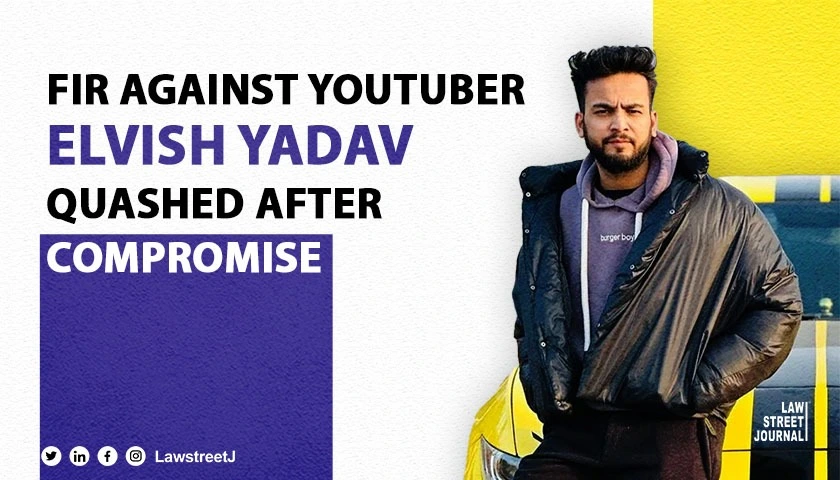Punjab: The Punjab and Haryana High Court has recently quashed an FIR registered against YouTubers Elvish Yadav and others after a compromise was reached with the victim, Sagar Thakur (also known as Maxtern), who is also a content creator.
The court found that the parties had amicably settled the matter through a compromise deed, and the victim had willingly consented to the quashing of criminal proceedings.
"As per the FIR, petitioner-Elvish Yadav and respondent no.2 Sagar Thakur assert themselves as social influencers and content creators on YouTube, Instagram, and 'X' (formerly Twitter). While violence portrayed in the media may seem 'cool' or entertaining, attracting a wide audience across platforms, such content often serves to further a narrative or garner viewership and associated popularity, influencing societal perceptions detrimentally, illustrating a story, and promoting hero culture. Such actual use of violence in society cannot be accepted and needs to be condemned," the court observed.
FACTS
An FIR was registered against Elvish Yadav and others under Sections 147, 149, 323, and 506 of the IPC on March 8, 2024, at Police Station Sector 53, District Gurugram. The complainant, Sagar Thakur, alleged that Elvish Yadav and his accomplices had assaulted him and threatened to kill him.
During the pendency of the criminal proceedings, the accused and the victim reached a compromise, and a compromise deed was executed on April 6, 2024. The parties approached the High Court seeking quashing of the FIR and consequential proceedings based on the compromise.
ARGUMENTS
The counsel for the petitioners argued that the parties had amicably settled the matter through a compromise deed, and the victim had willingly consented to the quashing of criminal proceedings. It was further argued that the offenses did not affect public peace or tranquility and were essentially of a private nature.
The counsel appearing for the State opposed the quashing of the FIR, contending that the offenses under Sections 147 and 149 of the IPC were non-compoundable.
DECISION
The court, after considering the relevant precedents and the facts of the case, held that the offenses involved were non-heinous and predominantly of a private nature. The court observed that the parties had amicably settled their dispute, and the victim had willingly consented to the nullification of criminal proceedings.
Furthermore, the court noted that the petitioners were social media influencers with a considerable following, and their actions could have a detrimental impact on the impressionable minds of the youth. To ensure that such violent acts are not repeated and to deter the petitioners from promoting violence and substance abuse in their content, the court imposed a condition while quashing the FIR.
The court also referred to Shiji @ Pappu v. Radhika and Ramgopal v. The State of Madhya Pradesh, wherein it was held that the High Court can quash prosecution even in cases where the offenses are non-compoundable, keeping in view the nature of the offense, the fact that parties have amicably settled their dispute, and the victim has willingly consented to the nullification of criminal proceedings.
The court quashed the FIR and all subsequent proceedings against the petitioners, subject to the condition that they refrain from depicting or promoting violence and substance abuse in any of their social media posts or content. If they engage in such behavior, the State of Haryana was given liberty to apply for recall of the order and restoration of the FIR.
In conclusion, the court invoked its inherent jurisdiction under Section 482 of the CrPC and quashed the FIR and all subsequent proceedings against the petitioners, subject to the imposed condition.




![Police protection to fund manager alleging threat from Kirron Kher & aide: Punjab & Haryana HC [Read Order]](/secure/uploads/2023/12/lj_9007_Police_Kirron_Kher.jpg)
![Most interested witness being the father of deceased, SC upholds acquittal of 6 accused for murder [Read Judgment]](/secure/uploads/2023/12/lj_9904_df2c02a2-d8c5-4dd6-8b58-a59e17b8635b.jpg)
![Supreme Court Collegium approves new Chief Justices for five key High Courts in India [Read Recommendations]](/secure/uploads/2023/12/lj_8000_380d1135-6f3a-4988-a00a-4d5cd5901815.jpg)






